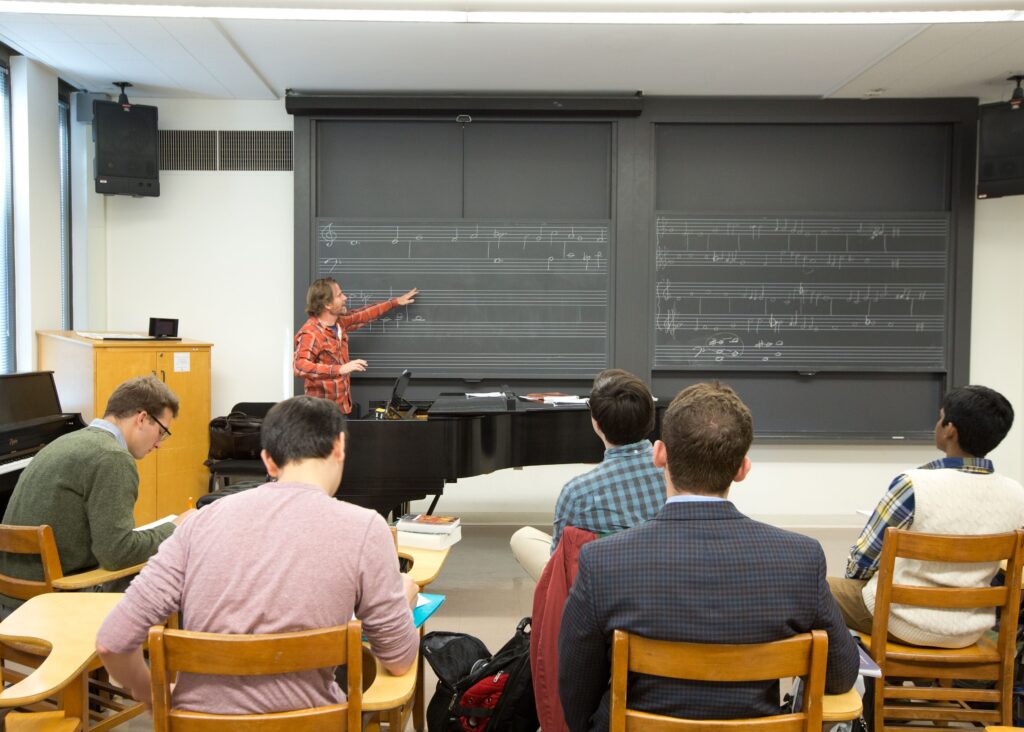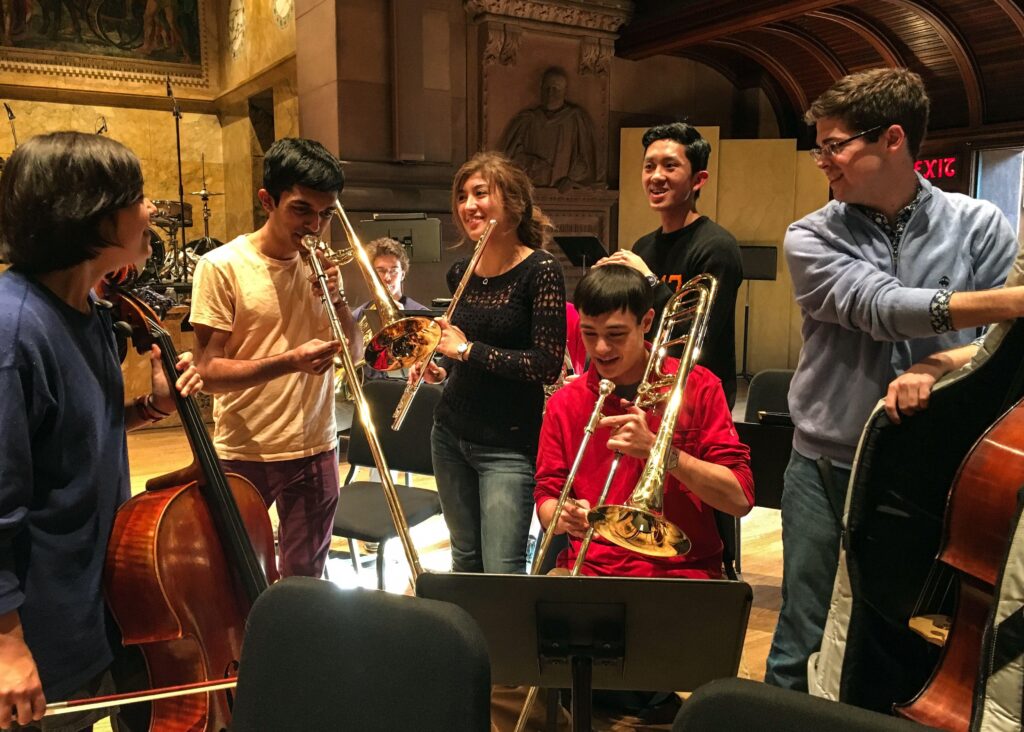As a Music Major, you can engage in independent work in musicology or composition while diving into the intersection of making, studying, and writing about music. As part of the major, students pursue work in two loosely defined areas: Culture and Criticism (C&C) and Materials and Making (M&M). M&M encompasses topics usually explored in hands-on, exploratory ways, such as composition, improvisation, theory, analysis, and electronic music. The C&C area focuses on the scholarly study of music, from music history and theory to cognitive science and ethnography. Whether our concentrators ultimately choose to make music, to research and write about it, or do both, they are encouraged to develop independent work that moves across traditional disciplinary or methodological boundaries.

Culture and Criticism (“C&C”)
Culture and Criticism courses focus on the scholarly study of music, from historical and formalist analysis to cognitive science and ethnography.

Materials and Making (“M&M”)
Materials and Making courses encompass topics usually explored in hands-on, exploratory ways, such as composition, improvisation, theory, analysis, and electronic music.
Process: All Princeton University A.B. undergraduate students declare their concentration in March/April of the sophomore year in conference with the Director of Undergraduate Studies through the Office of the Dean of the College.
Pre-Requisites:
- The completion of MUS 105, one M&M course, and one C&C course
As you design your program of study, we encourage you to not only lead with your strengths, but to also step out of your comfort zone. The Department of Music’s Director of Undergraduate Studies (“DUS”) is available to help guide your choices. You can meet with the DUS as soon as your first year to plan potential paths through the curriculum, which is advisable as some upper-level courses have their own prerequisites.
Eleven courses are required, distributed as follows:
| Pre-Requisites (3): | MUS 105, one M&M course and one C&C course |
| Materials & Making Courses (2)*: | Two M&M courses (in addition to the pre-requisite M&M course) Please note that one of the three total M&M courses, including the M&M prerequisite, must include a significant musicianship/ear-training component; current eligible courses are MUS 106, MUS 245, MUS 261, MUS 316, and MUS 319, or an alternative approved by the Director of Undergraduate Study. MPP 298-299, Independent Instruction in Voice or Instrument, can only be taken once. |
| Culture & Criticism Courses (2)*: | Two C&C courses (in addition to the pre-requisite C&C course) |
| Electives (3): | Three additional electives of your choice, two of which should be at the 300-level or higher |
| Junior Seminar (1): | A fall-term Junior Seminar (MUS 300) serves as an introduction to some of the methodological, technical, creative, and disciplinary issues entailed in the study and making of music. Assignments may relate to, or inform, students’ independent work, but will be graded separately. Students who are abroad during the fall of the junior year can complete the Junior Seminar during the fall term of the senior year. |
In addition to the required courses, students pursue independent work projects during their junior and senior years. These projects can take many forms, including research and writing about a topic of interest, composing new music, or a combination of the two. Even within that range, there is enormous flexibility: essays might focus on performance practices, cultural studies, historical research, analytical or theoretical studies, and more; while composition projects might take the shape of, for example, an album of songs, a string quartet, an instrument-building project, a music-theater work or scenes from an original opera, an orchestral piece, or improvisation-centered work. Hybrid projects that combine written work with compositional work (in the broadest sense) are also possible and encouraged.
Students seeking financial support for independent work research can identify funding opportunities and submit applications through the Student Activities Funding Engine (SAFE).
Junior Independent Work
The junior independent work project is due in the spring semester of the junior year, and is developed in consultation with a faculty advisor identified during the fall semester of the junior year. For reference, past projects have consisted of a research paper of approximately 30–40 pages, or an original composition of roughly 6–10 minutes (which would typically include a short paper detailing motivations and context for the composition). These are only guidelines, and the eventual scale of the work will depend on its nature.
Important Deadlines
Junior Independent Work Advisor Selection
Junior Independent Work Submission
Juniors should begin to identify a faculty advisor for their senior thesis in the spring of their junior year.
Senior Independent Work
The senior thesis is a year-long project devised by the student in conjunction with a faculty adviser, presented as a research paper of approximately 60–80 pages, or an original composition of roughly 12–20 minutes (including a short accompanying paper). As with junior independent work, these parameters are only guidelines, and the eventual scale of the work will depend on its nature. The topics for junior and senior independent work are often related, though they do not have to be. The thesis grade is the average of the grades given by the faculty adviser and a second faculty reader.
Important Deadlines
Senior Thesis Advisor Selection
Senior Thesis Submission
On May 7, 2025, in Woolworth 102 senior concentrators take a final departmental examination in the form of a public presentation of their senior thesis. The presentation includes an overview of the thesis’ motivation, methodology, and findings. The total duration of the presentation should not exceed 30 minutes. Each presentation is followed by 10-15 minutes of questions from the thesis advisor and others in attendance. The presentations are graded by the thesis advisor and a preselected second reader.
Honors—which designate that a student’s degree will be awarded with honors, high honors, or highest honors—are determined after careful consideration of a student’s academic record and involvement in the Department of Music, as translated into a Departmental Grade Point Average. Scores are calculated as follows:
Senior Thesis: 30%
Departmental Courses (8 highest MUS/MPP course grades): 40%
Junior Independent Work: 20%
Departmental Exam (Senior Thesis Presentation): 10%
Honors and awards are announced and presented during the Department of Music’s Awards Ceremony and Reception on Class Day.
Recent Music Major Perspectives
Read More Senior Spotlights

What Six Senior Music Majors’ Say About Their Theses
May 16, 2024
As we near the final weeks of spring semester and anticipated graduation for the Class of 2024, the Music Department asked six Senior Music Majors to expand on their creative thesis, as well as share words of encouragement to future students.

Music Major Kasey Shao Named 2024 Gilmore Young Artist
Sep 18, 2023
The Department of Music congratulates Kasey Shao (Class of 2025), a Music Major who is pursuing Minors in Piano Performance and Engineering Biology, who was one of two students named 2024 Gilmore Young Artists. We caught up with Kasey this summer following the official announcement to discuss how she found out she’d been selected, what she has planned for her 2024 Gilmore recitals and piano commission, and what’s on the docket for her final two years at Princeton.



